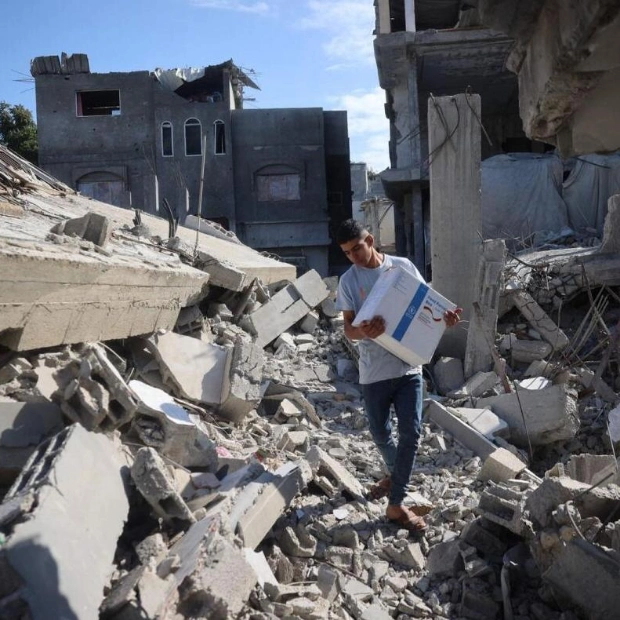With Giorgia Meloni at the helm, Italy likely has the most overtly anti-abortion prime minister in western Europe. However, in the predominantly Catholic nation that houses the Vatican, terminating pregnancies has always been a challenging endeavor. When Linda Feki, a 33-year-old singer and musician from Naples, shared her harrowing experience of stigma and mistreatment during an abortion procedure, she garnered an outpouring of empathy from numerous Italian women who related to her ordeal. Conversely, she also faced backlash and derogatory remarks, highlighting the deepening national rifts over reproductive rights under Meloni's administration.
"I chose to publicize my story... because I have a public persona, which might amplify my voice. I felt a dual responsibility as a citizen and an artist to advocate that abortion is a fundamental right," Feki explained to Reuters. Abortions in Italy are legally permissible within the first trimester, and later if the mother's health is gravely at risk. Nonetheless, bureaucratic, cultural, and practical hurdles often impede access.
According to health ministry data, approximately 63% of gynecologists in Italy are classified as "conscientious objectors," declining to participate in abortions due to ethical reasons. This number escalates to over 80% in certain southern regions. Feki recounted her initial visit to Naples' San Paolo hospital, where a gynecologist doubted her genuine intent to abort and erroneously claimed her pregnancy was further along than possible, given her last encounter with her long-distance partner. When confronted, the doctor insinuated infidelity, a claim refuted by a subsequent private scan that confirmed an earlier gestational stage.
Dr. Luigi Terracciano, head of Gynecology and Obstetrics at San Paolo, expressed regret over Feki's negative experience. "I am eager and interested in meeting her to clarify the circumstances, should she desire the same," he stated to Reuters. Feki then sought help at Cardarelli hospital, where she described experiencing severe pain from pre-surgery medication without any offered pain relief. Post-surgery, a "conscientious objector" nurse initially ignored her distress call.
She underwent the procedure on March 4, coinciding with France's constitutional recognition of abortion rights. On Instagram, Feki expressed her distress at being chastised about her pregnancy by the surgeon and nurses immediately post-operation. "There should be no judgment on a decision that is our right," she emphasized to Reuters. A Cardarelli spokesperson welcomed Feki's feedback, acknowledging potential areas for enhancing patient care services, and confirmed ongoing communication with the artist.
Meloni, 47, became Italy's first female prime minister, leading a conservative government since 2022. In her bestselling autobiography, "I am Giorgia," she revealed being born after her single mother's late decision against abortion. Despite her personal stance against abortion, Meloni pledged not to alter or repeal the 1978 law legalizing it, focusing instead on a more comprehensive enforcement, including prevention measures. Her coalition has enacted laws allowing "pro-motherhood" groups into abortion advisory clinics and recently introduced a "motherhood income" of 1,000 euros per month for five years, aimed at low-income pregnant women attending these clinics.
During the G7 summit in June, Meloni advocated for the exclusion of references to "safe and legal abortion" from the final declaration, citing a desire not to offend guest Pope Francis, who has condemned abortion as "murder." Anti-abortion groups maintain a vocal presence in Italy, with strong ties to several ruling coalition lawmakers. Jacopo Coghe, a spokesperson for the "We Choose Life" rally organizers in Rome, noted an intensification of societal divisions.
"The climate has shifted; our activists, particularly the youth, are more resolute. However, incidents of intolerance towards us have risen, with 10 acts of vandalism against our premises in the past 4-5 years," he detailed. Coghe anticipates no changes to the abortion law under Meloni but aims to sway public opinion against it, setting the stage for potential repeal. Meanwhile, he hopes the government will intensify efforts to prevent abortions, especially by supporting financially insecure expectant mothers.
Advocates for abortion rights argue that financial support for pregnant women, particularly those in need, is beneficial but should not entail stigma or psychological coercion. Francesca Pierazzuoli, a psychologist overseeing abortion advisory clinics in the greater Milan area, clarified that their services are not persuasive, and anti-abortion groups have not infiltrated the clinics she manages. Elisabetta Canitano, a Rome-based gynecologist and long-time abortion rights advocate, criticized those attempting to persuade women to retain unwanted pregnancies, stating they "have no comprehension of the torment they inflict."






